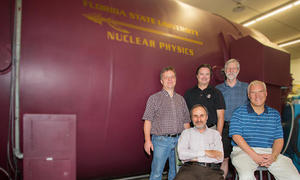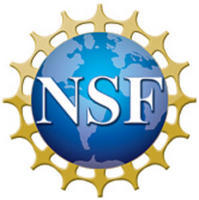Team nets $4.5 million to further nuclear physics research
A team of Florida State University researchers has won a $4.5 million grant from the National Science Foundation to probe deeper into the world of nuclear physics and to train the scientists of tomorrow.

Clockwise from top left are Ingo Wiedenhoever, Mark Riley, Anthony Frawley, Paul Cottle and Samuel Tabor.
The team of researchers, consisting of physics Professors Samuel Tabor, Paul Cottle, Anthony Frawley, Mark Riley and Ingo Wiedenhoever, operate the John D. Fox Superconducting Accelerator Laboratory at Florida State, which performs cutting-edge research in nuclear physics and nuclear astrophysics. The lab also prepares graduate and undergraduate students for careers in defense, homeland security, nuclear medicine, academia and basic research.
“This lab put Florida State on the world map in nuclear science in a big way,” said Tabor, the principal investigator for the grant and director of the lab. “And this funding will help our lab continue to grow.”
The lab has been in existence at Florida State since 1958 when then-Gov. Leroy Collins established the university’s nuclear physics program. The program has since gone on to be one of the top producers of doctoral degrees in nuclear physics in the country.

“This grant award is a strong affirmation that as a group we continue to conduct world class nuclear physics research at FSU, that our program keeps attracting and producing outstanding students, and that the internal support from the department, college and university toward these research endeavors remains absolutely first class,” said Riley, a Robert O. Lawton Distinguished Professor.
The lab focuses on fundamental research in nuclear physics and astrophysics. Moving forward, Tabor said, the scientists are focusing on trying to understand the underpinnings of astrophysics.
But more importantly, the group added, the grant is an economic investment in the local community. In addition to supporting the five faculty members, the lab will also help fund a dozen doctoral students, four high-tech staff members and also some undergraduate students.
“The FSU lab has been extraordinarily successful in preparing students at both the graduate and undergraduate levels for careers in science and technology —and not just in nuclear physics,” said Cottle, the Steven Edwards Professor of Physics. “It has been a tremendous resource for Florida’s students.

